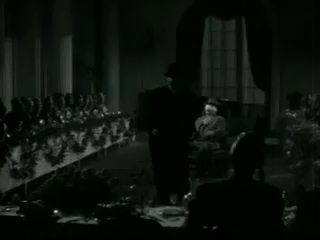Babbitt

The classical aurea mediocritas,
a man whose happiness consists in not knowing he is happy.
The temptations
are two, he might give everything up for the life of a fiddling grasshopper
like the college pal who shoots his pestering wife, or he might pillage the
town of Zenith like the city planning commissioner and “the biggest
banker in this county” he looks up to, who have no wives at all.
Mrs. B. is
“just about the smartest woman in nine counties”.
Keighley is the
finest director in the whole state, and takes this to town like the seminal
work it is. The domain of George F. Babbitt, realtor
and lodge brother, is that of Laurel and Hardy (cf. Fred M. Guiol’s Love ‘em and
Weep, James W. Horne’s Chickens
Come Home— and Come Clean). The proposed fishing trip is undertaken by Ken
Annakin’s Three Men in a Boat. The swindle is a venerable one and perhaps may be said to
figure in Billy Wilder’s Buddy Buddy. Mr. B.’s
secretary, who translates his guff into English, figures as well in Zeffirelli’s Tea
with Mussolini.
Or again,
consider the structure as a man’s life, Dickens’ A Christmas Carol, say.
The key film for any understanding of it is almost exactly contemporary,
Dieterle’s Fashions of 1934. Woman is a strange annoyance like his daughter’s
gardenia at the breakfast table, or a great ungraspable mystery like Rosalie
the maid dishing up, “if I was to hit the numbers, the fust thing I’d buy me would be a rope o’ them
gardenias, and I’d put ‘em around me two
or three times...” The developer of Floral Acres
(“The Home Development Beautiful”) is literally blindfolded before
the enigma as a jest by his lodge and deaf to the harangue endured by “the
kindest-hearted, sweetest fella a man ever had for a
friend.” Finally it’s a criminal action
conveyed to a bit on the side he badly misconstrues, and then the matter is
brought to a settled conclusion.
Andre Sennwald of the New York Times, “regards the immortal George F. with a human and sympathetic eye... an enjoyable entertainment... an amusing entertainment.” Leonard Maltin, “dumbed down”. TV Guide, “sluggish... lackadaisical direction...” Halliwell’s Film Guide, “quite tolerable”, citing Variety, “trite.”
“G”
Men
Virtue is praised
and starves in a dusty New York law office practicing speeches and flinging a
sharp pen at a pesky fly on the opposite wall. An
unarmed agent is shot down in the street with a rifle from an upstairs window
(the gangster asks for a “reacher”). The FBI gets a new recruit, and so begins his training
(boxing, jujitsu, Rifles and Ammunitions, fingerprints, ballistics,
marksmanship, etc.).
The rackets boss
who raised him from the slums is going legit, the leftovers of the gang embark
on a crime spree. The recruit falls for his
supervisor’s sister. The girl he left behind him
marries the new mob boss.
A terrifically
brutal picture of the Thirties gangsters, so much so that Variety
lamented a want of psychology and complained of “a weak scenario along
hackneyed lines,” while noting, “this is red-hot off the front
page.”
The technique is
a little ahead of its time, perhaps twenty or thirty years, in some respects.
The Prince And The Pauper
The Great Seal of
England, to crack nuts with. A work so well known,
nobody knows it.
And it’s
good for that too, the King acknowledges.
Such a perfect
understanding of Twain’s technique belies Halliwell’s complaint
that “it never seems to hit the right style or pace,” whereas Variety’s
distinctly odd review wants Flynn on sooner, with a girl, therefore “it
is not enough” (but there is a girl, at The Running Fox).
A massive,
complex structure (visibly from Oliver Twist, for example) to encompass
all the points and make the main one.
George Washington Slept Here
“This is
1942,” says Mr. Kimber, and this is the state of the union, delivered by
Moss Hart and George S. Kaufman.
“Farcical
nonsense,” said Bosley Crowther of the New York Times,
“purely machine-made comedy.”
“A sock
comedy” (Variety).
Halliwell’s
Film Guide couldn’t see the
humor in it, “disappointingly stiff and ill-timed version of a play that
should have been a natural.”
Target for Today
A restricted
training film describing the massive efforts in every detail of a single
bombing mission over targets in Germany, 1944.
Every aspect is
touched upon before, during and after the mission, from the initial directive
to the final crew interrogations.
Keighley is
attributed as director, films active personnel in their roles, swiftly edits the
fighter attacks, elucidates the entire proceeding as far as possible, and
certainly provides the narration.
The Master of Ballantrae
The house is
divided on the return of Bonnie Prince Charlie, Kimmins’ film provides a
précis of events. The master is proscribed and betrayed but comes up trumps in
the West Indies.
The point of it
all is to reveal not deadly hatred but a lovers’ quarrel at the heart of
it all.
The somewhat glib
technique precisely takes the mickey out of this, so that reviewers have scarcely
taken notice. H.H.T. of the New York Times praised everything, the cast
and Jack Cardiff’s cinematography, The Sea Hawk is mentioned in
his review, he let it pass.
“Half-hearted”,
says Halliwell’s Film Guide, citing Gavin Lambert, “rather
unforgivable”.